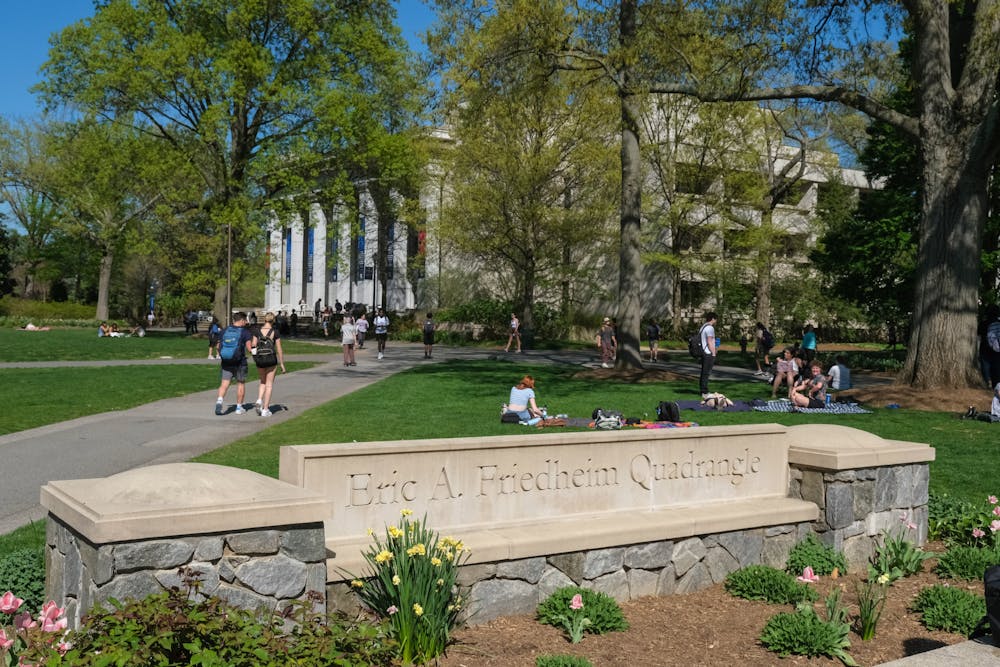Multiple American University students have had their visas revoked by the Department of Homeland Security, leaving them at risk of deportation.
Matt Bennett, vice president and chief communications officer, confirmed that AU students were affected on April 18 and said that the University’s priority is “engaging with them, providing resources, and protecting their privacy.” He declined to say exactly how many students were affected.
“We are committed to protecting the privacy of our students while addressing their individual circumstances with urgency and care,” Bennett wrote in a statement to The Eagle.
The University’s International Student and Scholar Services office held a webinar on April 16 to provide international students with information regarding recent threats by the Trump administration. According to a student who attended the webinar, the Director of ISSS Senem Bakar, confirmed that multiple AU students had their visas revoked and provided attendees with connections to legal services.
The Eagle granted anonymity to the student source because they feared retaliation from the University or the federal government due to their international student status if they were quoted by name. The Eagle made every effort to obtain the information on the record.
According to reporting from American Way of Life, Acting Provost Vicky Wilkins first told community members about changes to multiple student visas during a community forum on April 17. Wilkins confirmed in an email on April 21 to AWOL that the federal government had revoked multiple AU student visas.
Student visas are jointly managed by the federal government and the university hosting the international student, according to a policy brief by the American Immigration Lawyers Association.
In addition to visas, universities also use the Student and Exchange Visitor Information System, or SEVIS, to track the status of international students. Universities must report “initial admission, course load, when they transfer, extend their stay, or engage in employment, as well as when their address changes” into the SEVIS system.
Recently, Immigration and Customs Enforcement has been entering the system and terminating SEVIS records without alerting universities, according to The Boston Globe. Universities can only find out about the terminations by monitoring the systems themselves.
"Our teams that support international students closely monitor immigration information in the SEVIS database and immediately engage with students that experience changes to their visa status,” Bennett said.
Ten community members at Georgetown University and 15 students at George Mason University have had their visas revoked, according to DC News Now.
“We have proactive and comprehensive structures and processes in place to provide support to affected students,” Bennett said. “Our dedicated teams provide academic advising, connect students to health and wellness resources, and direct them to immigration and/or legal resources if such assistance is required to ensure they have the tools and support needed during this time.”
While student visas can be revoked at the federal government’s discretion, revocations after a student has entered the country often only occur in extreme cases according to the brief.
According to the policy brief, visa revocation is not enough to qualify a student for removal. While the revocation can impact a person’s ability to reenter the U.S. after departure, it doesn’t call for immediate removal from the U.S.
However, once a SEVIS record is terminated, the student “immediately loses employment authorization, cannot re-enter the U.S. if they depart, and if they have any dependents (spouses or children), their status is also terminated.”
This means that students do not have the opportunity to hear the specific charges against them or defend themselves through due process.
There have been “widespread reports” of ICE terminating SEVIS records in cases of those with minor misdemeanors, or those with charges that were later dismissed, the AILA brief said.
According to the policy brief, ICE says these records were terminated because of “serious adverse foreign policy consequences” and “otherwise failing to maintain status.”
According to a tracker from Inside Higher Ed, over 1,700 students from over 200 colleges and universities have been affected.
This is a developing story and will be updated as more information becomes available.
Correction: This article previously stated that a tracker from Insider Higher Ed showed that over 1,300 students had experienced visa revocations nationwide. The article has been updated to reflect the most accurate number available at the time of publication.
This article was edited by Owen Auston-Babcock, Payton Anderson and Walker Whalen. Copy editing done by Luna Jinks.





